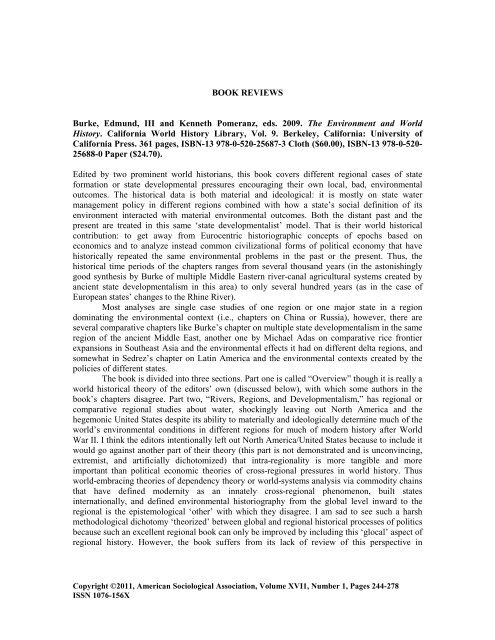Entire Volume 17 issue 1 - Journal of World-Systems Research ...
Entire Volume 17 issue 1 - Journal of World-Systems Research ...
Entire Volume 17 issue 1 - Journal of World-Systems Research ...
You also want an ePaper? Increase the reach of your titles
YUMPU automatically turns print PDFs into web optimized ePapers that Google loves.
BOOK REVIEWS<br />
Burke, Edmund, III and Kenneth Pomeranz, eds. 2009. The Environment and <strong>World</strong><br />
History. California <strong>World</strong> History Library, Vol. 9. Berkeley, California: University <strong>of</strong><br />
California Press. 361 pages, ISBN-13 978-0-520-25687-3 Cloth ($60.00), ISBN-13 978-0-520-<br />
25688-0 Paper ($24.70).<br />
Edited by two prominent world historians, this book covers different regional cases <strong>of</strong> state<br />
formation or state developmental pressures encouraging their own local, bad, environmental<br />
outcomes. The historical data is both material and ideological: it is mostly on state water<br />
management policy in different regions combined with how a state’s social definition <strong>of</strong> its<br />
environment interacted with material environmental outcomes. Both the distant past and the<br />
present are treated in this same ‘state developmentalist’ model. That is their world historical<br />
contribution: to get away from Eurocentric historiographic concepts <strong>of</strong> epochs based on<br />
economics and to analyze instead common civilizational forms <strong>of</strong> political economy that have<br />
historically repeated the same environmental problems in the past or the present. Thus, the<br />
historical time periods <strong>of</strong> the chapters ranges from several thousand years (in the astonishingly<br />
good synthesis by Burke <strong>of</strong> multiple Middle Eastern river-canal agricultural systems created by<br />
ancient state developmentalism in this area) to only several hundred years (as in the case <strong>of</strong><br />
European states’ changes to the Rhine River).<br />
Most analyses are single case studies <strong>of</strong> one region or one major state in a region<br />
dominating the environmental context (i.e., chapters on China or Russia), however, there are<br />
several comparative chapters like Burke’s chapter on multiple state developmentalism in the same<br />
region <strong>of</strong> the ancient Middle East, another one by Michael Adas on comparative rice frontier<br />
expansions in Southeast Asia and the environmental effects it had on different delta regions, and<br />
somewhat in Sedrez’s chapter on Latin America and the environmental contexts created by the<br />
policies <strong>of</strong> different states.<br />
The book is divided into three sections. Part one is called “Overview” though it is really a<br />
world historical theory <strong>of</strong> the editors’ own (discussed below), with which some authors in the<br />
book’s chapters disagree. Part two, “Rivers, Regions, and Developmentalism,” has regional or<br />
comparative regional studies about water, shockingly leaving out North America and the<br />
hegemonic United States despite its ability to materially and ideologically determine much <strong>of</strong> the<br />
world’s environmental conditions in different regions for much <strong>of</strong> modern history after <strong>World</strong><br />
War II. I think the editors intentionally left out North America/United States because to include it<br />
would go against another part <strong>of</strong> their theory (this part is not demonstrated and is unconvincing,<br />
extremist, and artificially dichotomized) that intra-regionality is more tangible and more<br />
important than political economic theories <strong>of</strong> cross-regional pressures in world history. Thus<br />
world-embracing theories <strong>of</strong> dependency theory or world-systems analysis via commodity chains<br />
that have defined modernity as an innately cross-regional phenomenon, built states<br />
internationally, and defined environmental historiography from the global level inward to the<br />
regional is the epistemological ‘other’ with which they disagree. I am sad to see such a harsh<br />
methodological dichotomy ‘theorized’ between global and regional historical processes <strong>of</strong> politics<br />
because such an excellent regional book can only be improved by including this ‘glocal’ aspect <strong>of</strong><br />
regional history. However, the book suffers from its lack <strong>of</strong> review <strong>of</strong> this perspective in<br />
Copyright ©2011, American Sociological Association, <strong>Volume</strong> XVI1, Number 1, Pages 244-278<br />
ISSN 1076-156X





